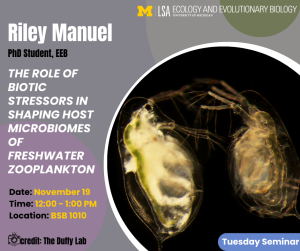Presented By: Ecology and Evolutionary Biology
EEB Tuesday Seminar Series - The Role of Biotic Stressors in Shaping Host Microbiomes of Freshwater Zooplankton
Riley Manuel, EEB PhD Student, Rackham Merit Fellow

This event is part of our ongoing Tuesday Seminar Series.
About this seminar: My proposal investigates how biotic stressors, specifically cyanobacteria blooms and parasitic infections, impact the microbiome of Daphnia dentifera, a freshwater zooplankton. Given the role of host-associated microbiomes in conferring resilience to the host, understanding how these stressors impact microbe-microbe and microbe-host interactions is essential. Cyanobacteria blooms, formed by rising temperatures and nutrient runoff, can reduce microbial diversity through competitive exclusion, altering microbial networks both internal and external to the host. Parasites are another potential source of dysbiosis in the host-associated microbiome. Successful infections can further lower host fitness, potentially independent of virulence, by disrupting the microbiome and thus losing key metabolic pathways related to nutrient acquisition and the formation of secondary metabolites. To address the extent to which both stressors reassemble microbiomes and environmental microbial communities, I will address three questions that 1) distinguish between parasite virulence and microbiome dysbiosis impacts on host fitness, 2) test for potential additive or synergistic effects of cyanobacteria and parasites in reducing host fitness as mediated through the host-associated microbiome, and 3) investigate microbiome re-assemblage under both stressors in the natural environment.
Join Remotely: https://umich.zoom.us/j/94285293918
Meeting ID: 942 8529 3918
Passcode: tuesem
About this seminar: My proposal investigates how biotic stressors, specifically cyanobacteria blooms and parasitic infections, impact the microbiome of Daphnia dentifera, a freshwater zooplankton. Given the role of host-associated microbiomes in conferring resilience to the host, understanding how these stressors impact microbe-microbe and microbe-host interactions is essential. Cyanobacteria blooms, formed by rising temperatures and nutrient runoff, can reduce microbial diversity through competitive exclusion, altering microbial networks both internal and external to the host. Parasites are another potential source of dysbiosis in the host-associated microbiome. Successful infections can further lower host fitness, potentially independent of virulence, by disrupting the microbiome and thus losing key metabolic pathways related to nutrient acquisition and the formation of secondary metabolites. To address the extent to which both stressors reassemble microbiomes and environmental microbial communities, I will address three questions that 1) distinguish between parasite virulence and microbiome dysbiosis impacts on host fitness, 2) test for potential additive or synergistic effects of cyanobacteria and parasites in reducing host fitness as mediated through the host-associated microbiome, and 3) investigate microbiome re-assemblage under both stressors in the natural environment.
Join Remotely: https://umich.zoom.us/j/94285293918
Meeting ID: 942 8529 3918
Passcode: tuesem